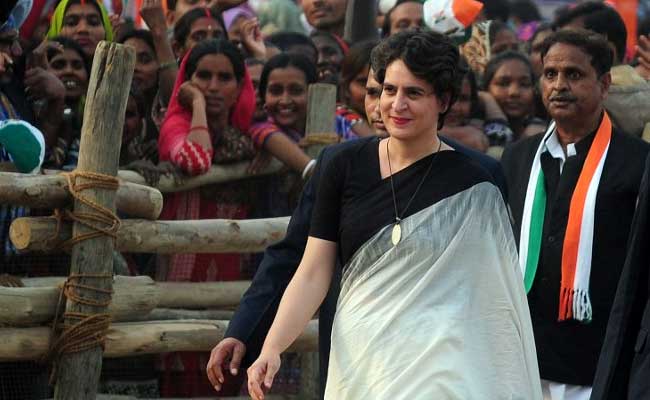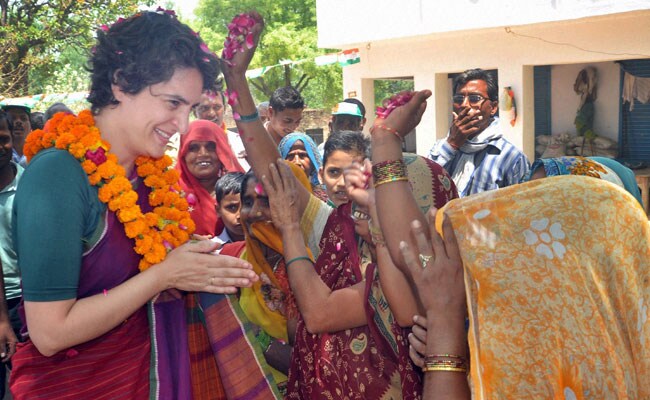Are we supposed to be wildly excited about the news - buried in the third paragraph of an anodyne press release from what should correctly still be called the Congress (Indira) - that another member of the Gandhi family has been given a position within the party organisation? I'm certainly not.
I have a theory about exactly who will be enthused by this development. There are only two types of people who will be pleased: those who hate the Indira Congress beyond bearing, and those who are irreparably attached to it. The vast mass of Indians who are broadly indifferent to the Congress (I) will be similarly unmoved by Priyanka Gandhi Vadra's appointment as General Secretary for Uttar Pradesh East. If anything, they will roll their eyes, unsurprised and perhaps a little disappointed, as I am.

Priyanka Gandhi Vadra, 47, will be the Congress general secretary in charge of the eastern part of Uttar Pradesh
Those with an irrational and visceral hatred of the Indira Congress have long waited for some such development. For most of them, it will serve as further proof that this party, which has not had a Nehru-Gandhi prime minister since 1989, is little more than a royal durbar. It is precisely this group that, in spite of hating the Indira Congress, has constantly suggested that Gandhi Vadra enter "active politics" if that party is to be "saved". This was, of course, duplicitous advice. It was just another way of making the claim that Rahul Gandhi is not up to the job that he's been given; and of underlining the fact to everyone else that the party has no options but those two. The Indira Congress, which loves to take bad advice from people who detest it, has fallen into the trap its haters set for it.
Those with no other alternative but to praise everything the Congress's Delhi leadership does, meanwhile, will naturally claim that a party member with no visible political experience beyond serving as a constituency manager for other family members is self-evidently the best choice for this, and no doubt for any other, job. There is nothing to be said in defence of this set of people; they cannot even be credited with the low cunning of those Congress-haters who exalt Gandhi Vadra. I doubt everyone in the Indira Congress genuinely believes in this theory of blood privilege. In fact, Rahul Gandhi's long apprenticeship in politics before he took over active control of his party - about as long as, say, Barack Obama's before he ran for president, longer than Emmanuel Macron's or David Cameron's - speaks well of him, and suggests that he at least does not share the view that anyone with the right descent is automatically qualified.

Rahul Gandhi and Priyanka Gandhi Vadra have campaigned together in his parliamentary seat Amethi as well as their mother's Raebareli seat
I wonder if this will change any minds in the political class about the Indira Congress's prospects in Uttar Pradesh, East or West. The Bharatiya Janata Party is worrying not about the sad rump of what was once India's Grand Old Party, but instead about the unlikely and surprisingly resilient alliance of Mayawati's Bahujan Samaj Party and Akhilesh Yadav's Samajwadi Party. That duo, meanwhile, have demonstrated what they think of the Congress (I)'s pretensions in UP by simply ignoring its claims to any seats other than those currently held by people named Gandhi.
The Indira Congress understandably is the focus of much of the anger that many people feel about dynastic politics in India. But to claim it is a Congress-only phenomenon is quite untrue. Dynastic politics is a disease to which democratic politics is prone. It is known to occur in not just developing but developed countries, in not just the East but the West. In the past decades, the United States had two presidents named Bush. In fact, five of the 10 major party nominees for US president in this century have been members of established political families. Closer to home, parties across the political spectrum and the breadth of India have given in to the lure of dynasty. Saddest perhaps is when movements once driven by ideology become family-run parties. Lohiaite socialists in UP and Bihar have been taken over by families named Yadav, for example; the heirs of Periyar in Tamil Nadu spring also to mind. Even regional and religious parties are not immune: consider how the once faction-ridden Akalis are now a Badal fiefdom, or the Senas of Maharashtra. And the process is still continuing, and visible even in a young party like the Telangana Rashtra Samiti.

Congressmen say Priyanka Gandhi Vadra was always active in decision-making
There are understandable and objectively rational reasons for the longevity of political dynasties in India. For voters who are starved of information or access, a familiar surname or familial connection is often useful shorthand for substantive political positions, or for commitment to a particular caste, community, region or cause. In addition, the resources of human, social and financial capital required to contest and win elections in India - or even to survive a lost election - are not easy to accumulate. Thus family members have a leg up in politics. This is why many Indian parties beyond Indira Gandhi's branch of the Congress have tended to devolve into becoming family-run. In fact, the appeal of dynasty to that particular party is perhaps the most understandable of all, given many of its members remember it began to fragment in the 1990s when there was no Nehru-Gandhi at the helm to hold it together.
Thus parties that have a strong cadre, or independent fund-raising, or which retain a strong ideological affiliation are least likely to nurture dynasties at the top. The Communists, of course, are the most obvious example of this, and to a lesser degree the Bharatiya Janata Party. More accurately, however, the BJP is not the property of a family but of a Sangh, and thus it is the favoured children of its ideological parent who are gifted positions within it. And, of course, there are multiple mini-dynasties within the BJP itself. Narendra Modi may speak often of his distaste for dynastic politics, but for some reason he has never been asked to explain why one in five of his Cabinet are dynasts.

Priyanka Gandhi Vadra entering active politics is likely to boost the morale of Congress workers in Uttar Pradesh (File)
Yet while Gandhi Vadra's elevation is perhaps understandable and not even unusual in Indian politics, it is still nothing to be pleased about. We are constantly told that she has great political talent. It may well be true. But there is no evidence of this available to the public as yet. Gandhi Vadra should have to prove it through working her way up through the organisation. Is not the claim, often repeated by the current Congress president, that he is working to strengthen inner-party democracy undermined by the fact that he's just handed a crucial battleground area to his sister to administer?
The truth is that Gandhi Vadra's appointment is not a good look for Indian politics in general and for her party in particular. If her branch of the Congress wishes to appear a modern, inclusive and stable national alternative to the Bharatiya Janata Party - which is, admittedly, a premodern, divisive and not even genuinely national party - then this is not how to go about it. It's an obvious step backward for the party that Rahul Gandhi leads, after a few years in which it has managed to move hesitatingly forward.
(Mihir Swarup Sharma is a fellow at the Observer Research Foundation.)
Disclaimer: The opinions expressed within this article are the personal opinions of the author. The facts and opinions appearing in the article do not reflect the views of NDTV and NDTV does not assume any responsibility or liability for the same.


